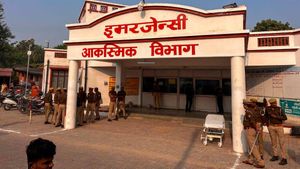Lord David Blunkett, the former home secretary and currently a Labour peer, is advocating for urgent changes on London Tube platforms following his recent fall at Westminster station. The incident has raised alarms about the safety conditions on public transport for visually impaired individuals.
Blunkett, who is blind and accompanied by his guide dog, Barley, sustained significant injuries when he attempted to board a District Line train. According to reports, as he stepped onto the train, he suddenly felt his feet slip down the gap between the platform and the train. "I found myself propelled forward, landing face down on the floor of the carriage," he wrote, relaying the moment of shock and pain he experienced.
The 77-year-old politician described the immediate aftermath of the fall, saying he was struck by extreme pain and ended up with bruised and grazed legs. After the incident, he underwent X-rays confirming he had not broken any bones but experienced what he termed as "extraordinary bruising." He expressed his frustration and anger about the situation, citing the incident’s severity heightened by his recent health issues, including being on blood thinners after suffering from a heart attack.
"When I entered the Tube station, I could hear the announcements urging riders to 'mind the gap', yet there was no one available to assist me at the platform," he remarked. This lack of support for passengers with disabilities raises concerns not only for Blunkett but for numerous others who rely on assistance. He is now calling for Transport for London (TfL) to take proactive measures to safeguard visually impaired individuals and other passengers who may be at risk.
Blunkett's assertions echo growing concerns about the design of some Tube stations. He described the platforms as "death traps," emphasizing the dangerous gap between the platform and the train being particularly hazardous for those unable to see. His experience has ignited demands for urgent reviews to address safety at the busiest Tube stations, focusing on filling these gaps and ensuring the presence of staff to assist passengers during rush hours.
Nick Dent, the director of customer operations for London Underground, expressed his regret over the incident, stating, "We were extremely sorry to learn about Lord Blunkett's injury on our network. We are committed to learning from this event to prevent similar injuries and improve passenger safety." He reiterated TfL’s commitment to ensuring customer safety and acknowledged the rarity of such incidents. Nonetheless, he assured the public of the organization's intention to continue improving safety measures across the network.
Blunkett’s public call to action resonates with broader issues of accessibility within transportation systems, as he pointed out how various platforms fail to accommodate those with disabilities adequately. He plans to meet with TfL shortly to voice his concerns formally and push for immediate safety changes. This meeting aims to address what many see as neglect for the needs of disabled passengers on public transportation.
Glancing at the wider picture of commuter safety, Blunkett’s fall highlights how truly vulnerable many passengers are, and it questions the adequacy of current safety protocols. His experience not only serves as a personal plea for improvement but echoes the experiences of many passengers who have encountered similar risks on public transport, especially during peak hours.
Although the transport authorities have system assurance processes, incidents like Blunkett's remind passengers and advocates alike of their incomplete effectiveness. While efforts are underway to create safe public transport for everyone, there remains much work to be done, particularly for the most vulnerable members of society.
Blunkett’s fall is not just about one individual’s misfortune but instead sheds light on systemic issues within transport safety for disabled individuals. His advocacy for change demands immediate response and action from officials tasked with ensuring public safety across London’s extensive transportation network.
Public awareness and pressure are mandatory to keep these issues on the agenda, as the effects of negligence can lead to injury or worse. It is now up to authorities like TfL to respond to these calls for change and prioritize safer, more accessible travel for all passengers.
Despite the trauma of his experience, Lord Blunkett's determination for change reflects resilience and advocacy for safety across public transportation systems. His actions and upcoming discussions with TfL will likely be pivotal for advancing the cause of improved safety measures on London’s Tube stations.
London's city planners and transport officials have been put on notice—providing adequate safety for all passengers, particularly those who face greater risks, must be at the forefront of their plans. Lord Blunkett's incident goes beyond one platform; it calls for systemic reform to cultivate safer, more inclusive transport systems.
There’s no doubt the voice of the public and representatives like Blunkett will carry substantial weight as they push for accountability and action to prevent future accidents on public transport.



